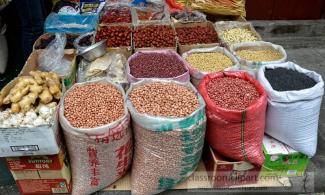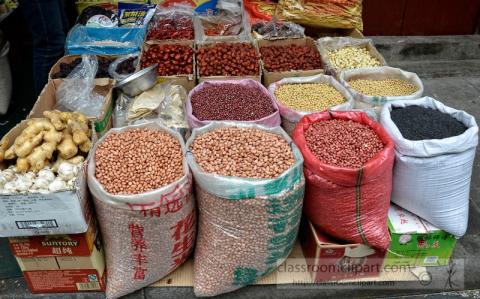
While many Nigerians believe this move would spark a food crisis in the South others have described it as an opportunity for the region to invest in agriculture.
The South-west may experience a food crisis as foodstuff and cattle dealers across the Northern part of the country have started diverting their goods and all consumables to the neighbouring countries of Niger Republic and Cameroon.
SaharaReporters reported that some groups blocked trade routes to the South by stopping food item-laden trucks on Friday.

While many Nigerians believe this move would spark a food crisis in the South others have described it as an opportunity for the region to invest in agriculture.
Recall that northerners on Friday stopped truckloads of food items from the northern part of the country from entering Kwara State and neighbouring states in the South West.
A video clip showing the illegal stoppage of trucks carrying food items from the North to the South at a Jebba village in Niger State by some northern youths circulated on social media on Friday.
But the Defence Headquarters clarified that following the tension generated by the incident, joint troops comprising the military and other security agencies were deployed to clear the Jebba-Kaduna Road. They had since restored normalcy in the general area.
Some Northern youths had prevented many trucks carrying items like tomatoes, onions, beans, yams and cattle from going beyond a location in Jebba called Kara into Kwara or other states to the South West.
The situation, it was gathered, caused the trucks to park by the roadside with some of their contents already going bad.
The development, it was learnt, was connected to an ultimatum given by the national leadership of the Miyetti Allah Cattle Breeders Association of Nigeria (MACBAN) to the Federal Government which demanded compensation for the losses suffered by Northern traders in the recent mayhem at Shasha market in Ibadan, Oyo State, and during the EndSARS protest.
The new trading network began shortly after the Northern Consensus Movement (NCM) and the Amalgamated Union of Foodstuff and Cattle Dealers of Nigeria commenced a strike on Thursday and blocked all 'borders' between the North and South.
The Northern groups also clarified on Friday that they were demanding only N4.7 billion as compensation for their members killed and properties destroyed during the Sasa crisis in Ibadan, Oyo State and the EndSARs protests in the western and eastern parts of the country, against the earlier reported N475 billion.
National President, Northern Consensus Movement, Awwal Abdullahi Aliu, told Tribune that the Federal Government had failed to meet all their demands, hence the commencement of the strike declared by the groups.
He stated that all the border roads between the North and West, North and South, and the North and East had been blocked against trucks carrying foodstuffs and other consumables from the North to any part of the South.
Vice-chairman of the Kwara State branch of the MACBAN, Alli Mohammad, said Kwara State had yet to carry out the association's demand except for some other northern states like Niger and Bauchi states which he said had started giving in to its demand.
Mohammad, who said that a meeting had been scheduled for Sunday to decide when to start the implementation of the demand in Kwara State, added that in the event of default, the traders would not necessarily be disallowed from entering the state but the traders would not even come with their goods.
"Except those who may decide to take other routes to get to the state or those who may act in defiance to the directive, the traders would not come from the North and those who come may be stopped or sanctioned," he said.
Aliu of the Northern Consensus Movement noted that his people would not lose anything if the situation persists.
He added that the foodstuff and cattle dealers had discovered another marketing opportunity as a result of the current challenge.
He said, "As I speak to you, my people are already shipping their goods, onions, tomatoes and what have you to Niger, Cameroon, and other neighbouring countries through Illela border.
"Already, we have diversified. Our people have already found a way of not wasting their goods. They will not be destroyed. They will be sold just like how they were being moved to the South West, South East or South-South.
"So, my people will end up not losing anything. We did not arrange this one; it just came up. Automatically, it started happening. People just quickly saw it and the goods started moving in those directions."
Some groups in southern Nigeria have reacted to the crisis, noting that the problem would be a blessing in disguise as many people in the region would be forced to invest in agriculture.